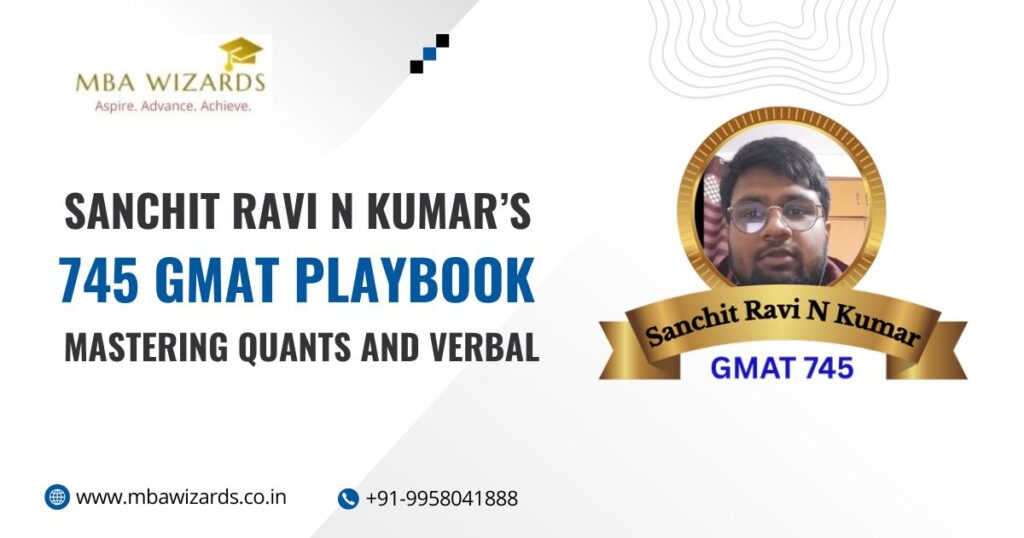Sanchit Ravi N Kumar’s 745 GMAT Playbook: Mastering Quants and Verbal

Meet Sanchit: From Uncertainty to a 745 GMAT Score
If you’re aiming for a top MBA, you know the GMAT can feel overwhelming. Sanchit Ravi N Kumar felt the same way. He balanced a demanding job in Bangalore with GMAT prep. His first mock scores were far from impressive. Quants seemed manageable, but verbal felt like a never-ending struggle. Sound familiar?
Sanchit’s switch from average to 745 wasn’t magic. He built a simple, clear routine. He tracked his progress, focused on real improvement, and got the right guidance when he needed it. You can do the same.
Why Master Both Quants and Verbal?
A lot of Indian GMAT takers trust their quant skills and ignore verbal. But business schools expect balance. Sanchit learned this early.
He realized that a high quant score alone wouldn’t make him stand out. He needed to close the gap on verbal to reach his 700+ target. This lesson shaped his entire approach.
Sanchit’s Quant Playbook
Start with a Reality Check
Sanchit didn’t assume anything. He took a diagnostic test to spot his real strengths and weaknesses. He used MBA Wizards’ analytics to see where he lost points.
Build Concept Clarity
- He revised core formulas and concepts daily.
- Short, focused sessions worked better than long study blocks.
- He kept a notebook just for mistakes and tricky questions.
Practice with a Purpose
- Sanchit solved 20–30 quant questions each day, not hundreds.
- He chose questions from official GMAT sources and MBA Wizards’ ability-based modules.
- He reviewed every mistake right away.
Tackle Data Sufficiency
He struggled here at first. So he practiced sets of only Data Sufficiency questions until he felt comfortable.
Shortcuts and Traps
He learned to spot common traps, especially in word problems. He kept a cheat sheet of frequent mistakes.
Sanchit’s Verbal Playbook
Drop the “Engineers Can’t Do Verbal” Myth
Sanchit started with an open mind. He treated verbal as a skill anyone can build.
Reading Comprehension
- He practiced active reading—summarizing each paragraph in a line.
- He timed himself on every passage.
- He wrote down why every wrong answer was wrong.
Sentence Correction
- He reviewed grammar rules and idioms every morning.
- He solved a few high-difficulty questions, not just easy ones.
- He made flashcards of errors he repeated.
Critical Reasoning
- He broke down arguments into premises and conclusions.
- For every question, he asked himself, “What is the author really saying?”
- He discussed tough questions with peers and coaches.
Habits That Made the Difference
Weekly and Daily Planning
- Sanchit set clear, small targets for each week.
- He mixed quant and verbal every day to avoid monotony.
- He used commute time for flashcards and quick revision.
Analytics Over Guesswork
- He tracked progress using MBA Wizards’ AI tools.
- He adjusted his plan based on his weakest areas.
- No topic got ignored if his scores dropped.
Balance, Not Burnout
- He took short breaks every hour.
- He never studied late into the night.
- He protected one day a week for rest.
Mock Tests and Deep Reviews
- Sanchit took a full-length mock every weekend under real test conditions.
- He spent more time reviewing errors than taking the test.
- He looked for patterns—slow timing, repeated mistakes, or careless errors.
The data showed him where to focus next. His scores started to climb.
Overcoming Roadblocks
Self-Doubt
When mock scores dropped, Sanchit didn’t give up. He reached out to his mentor and discussed what went wrong.
Tough Topics
He didn’t shy away from weak spots. If a topic felt impossible, he scheduled a live session with his MBA Wizards coach.
Staying Motivated
He joined a study group to keep things social and shared progress with friends.
Test Day: Sanchit’s Approach
- He ate a light breakfast and reached the test center early.
- He chose his strongest section first to build momentum.
- He managed his time with the on-screen clock.
- If a question stumped him, he guessed and moved on.
He focused on staying calm and trusted his prep.
Sanchit’s Top 7 GMAT Playbook Tips
- Take a diagnostic test before you plan anything.
- Log every mistake and review it weekly.
- Mix quant and verbal prep—don’t leave either for later.
- Use official and high-quality questions only.
- Take mocks seriously, but review them even more seriously.
- Ask for help when you’re stuck—mentors make a difference.
- Rest your mind. Consistency beats cramming.
How MBA Wizards Helped Sanchit Succeed
Sanchit credits his jump to 745 to the right guidance and a proven approach:
- Personalized coaching focused on his weak spots.
- Small batch sizes for real attention.
- AI-based analytics to track his progress.
- A community of students and mentors for support and motivation.
Sanchit’s story isn’t unique at MBA Wizards. Many students see big jumps when they stop guessing and start following a clear plan .
Ready to Build Your Own GMAT Playbook?
You don’t need to be a genius to crack the GMAT. You need a plan that fits your life and strengths. MBA Wizards can help you craft your own path—just like Sanchit did.
Want to see how it works? Book a free demo session. Start your journey to a 700+ score now.
FAQs
How did Sanchit balance prep for both quant and verbal?
He started every week with a clear plan. He split his time evenly and reviewed his performance after every mock. If one section slipped, he adjusted his focus right away.
What resources worked best for Sanchit’s quant practice?
He stuck with official GMAT guides and MBA Wizards’ targeted modules. He didn’t jump between sources. For tough topics, he reviewed his mistakes with a mentor before moving on.
How did Sanchit tackle verbal if it wasn’t his strong suit?
He made reading a daily habit. He worked on timed reading comprehension first thing each morning. He kept a notebook of common sentence correction errors and reviewed it before every mock.
Did Sanchit ever feel stuck during his prep?
Yes. He hit a plateau more than once. When that happened, he changed his routine, tried a new question type, or joined a peer group session for fresh ideas.
How did Sanchit manage his time with a job and GMAT prep?
He blocked out short study slots before work and during lunch. He didn’t wait for a “perfect” study window. Even 30 minutes a day added up when done consistently.
